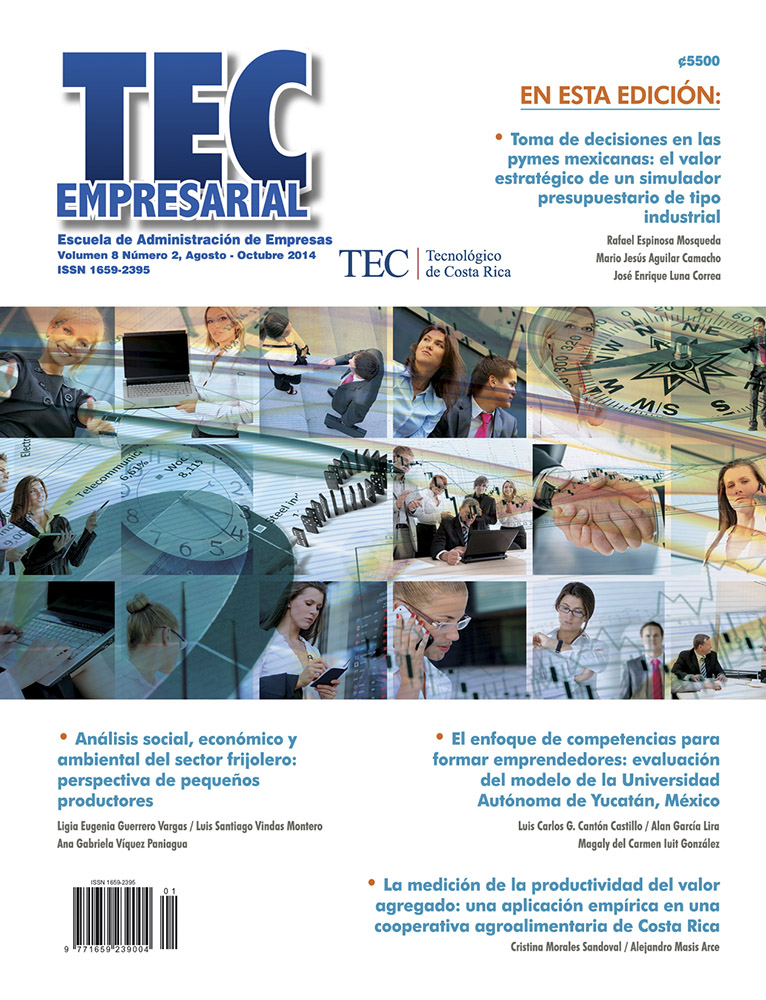Análisis Social, Económico y Ambiental del sector Friolero: perspectiva de pequeños productores (Social, economic and environmental analysis of the dry bean producers: A perspective on small size Costa Rican farmers)
Contenido principal del artículo
Resumen
En los últimos años, la actividad frijolera en Costa Rica ha ido perdiendo competitividad, afectada principalmente por los altos costos de producción y precios de importación más bajos; lo anterior lleva a cuestionarse si el cultivo del frijol debería seguir fomentándose, pero al evaluar no sólo el punto de vista económico, sino más bien haciendo especial enfoque a las repercusiones sociales, ambientales y culturales que conlleva la actividad. La investigación se plantea al carecer de información formal y documentada que permita visualizar la realidad del sector frijolero en aspectos sociales, ambientales y económicos en el campo de la sustentabilidad de gremios conformados principalmente por pequeños productores de empresas cooperativas y asociaciones, en los cantones de Upala, Guatuso y Los Chiles de la Zona Huetar Norte, así como en las localidades de Santa Cecilia y la Cruz de Guanacaste. Para lo anterior, se utilizó la metodología conocida como marco de evaluación MESMIS. Las conclusiones más relevantes arrojan que la actividad frijolera es una actividad familiar, con una alta vulnerabilidad en factores sociales y económicos asociados a la actividad, resultados que se vinculan directamente con la declaratoria del Año Internacional de la Agricultura Familiar (AIAF) 2014, propuesto por la FAO, que tiene como objetivo aumentar la visibilidad de la agricultura familiar y la agricultura a pequeña escala.
Abstract
During the latter years, dry bean production in Costa Rica has lost competitiveness due to high production costs and lower import prices that lead to reconsider whether dry bean production should still be encouraged but also consider the social, environmental and cultural consequences entailed in this activity. This research was driven by a lack of documented formal data that could help visualize the sector’s social, environmental and economic aspects that bind together the professional unions of mainly cooperative and rural associations of small farmers in the cantons of Upala, Guatuso and Los Chiles of the Northern Huetar Zone, as well as those from the communities of Santa Cecilia and La Cruz in the Guanacaste province. To this end, a methodology known as the MESMIS Evaluating Framework was used. The most relevant conclusions point out that dry bean production is a familial activity with high vulnerability to social and economic factors associated with this activity, that can be directly related to the declaration by FAO of the year 2014 as the International Year of Family Farming (IYFF) with the objective of increasing the visibility of family and small scale farming
Detalles del artículo
La versión digital de la revista se encuentra registrada bajo la licencia Creative Commons BY-NC-ND 4.0. Por lo tanto, esta obra se puede reproducir, distribuir y comunicar públicamente sin propósitos comerciales, siempre que: 1. Se reconozca el nombre de los autores y la revista Tec Empresarial, y 2. No remezcle, transforme o haga una creación a partir del original.
Los autores conservan los derechos de autor y ceden a la revista el derecho de la primera publicación y de que pueda editarlo, reproducirlo, distribuirlo, exhibirlo y comunicarlo en el país y en el extranjero mediante medios impresos y electrónicos. Por otra parte, el autor declara asumir el compromiso sobre cualquier litigio o reclamación relacionada con derechos de propiedad intelectual, exonerando de responsabilidad a la Escuela de Administración de Empresas del Tecnológico de Costa Rica.


